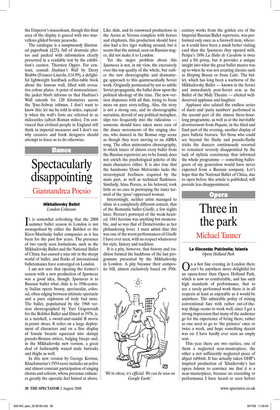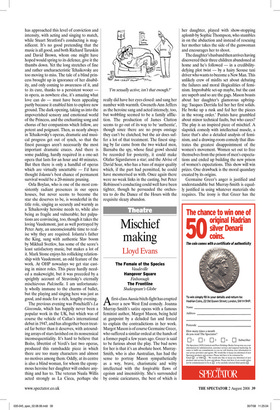Three in the park
Michael Tanner
La Gioconda; Pulcinella; Iolanta Opera Holland Park
On a hot fine evening in London there can’t be anywhere more delightful for an opera-lover than Opera Holland Park, which is now so comfortable, and has such high standards of performance, that to see a rarely performed work there is in all respects at least as enjoyable as it would be anywhere. The admirable policy of mixing conventional fare with rather out-of-theway things seems to work well, since I get a strong impression that many of the audience go for the experience of being there, rather as one used to go to ‘the pictures’ once or twice a week, and hope something decent was on. I have hardly ever seen an empty seat.
This year there are two rarities, one of them a neglected near-masterpiece, the other a not sufficiently neglected piece of abject rubbish. It has actually taken OHP’s inspired production of Tchaikovsky’s last opera Iolanta to convince me that it is a near-masterpiece, because no recording or performance I have heard or seen before has approached this level of conviction and intensity, with acting and singing to match, while Stuart Stratford’s conducting is magnificent. It’s no good pretending that the music is all good, and both Richard Taruskin and David Brown, whom one might have hoped would spring to its defence, give it the thumbs down. Yet the long stretches of fine and rather uncharacteristic Tchaikovsky are too moving to miss. The tale of a blind princess brought up in ignorance of her disability, and only coming to awareness of it, and to its cure, thanks to a persistent wooer — in opera, as nowhere else, it’s amazing what love can do — must have been appealing partly because it enabled him to explore new ground. The dark opening, taking us into the impoverished sensory and emotional world of the Princess, and the enchanting song and chorus of her companions which follow, are potent and poignant. Then, as nearly always in Tchaikovsky’s operas, dramatic and musical progress get out of synch, so that the finest passages aren’t necessarily the most important dramatic cruces. And there is some padding, hardly required in a one-act opera that lasts for an hour and 40 minutes. But then there is only a handful of operas which are virtually uncuttable — I’d have thought Iolanta’s best chance of permanent survival would be a 20-minute pruning.
Orla Boylan, who is one of the most consistently radiant presences in our opera houses, but never seems to become the star she deserves to be, is wonderful in the title role, singing as securely and warmly as a Tchaikovsky heroine needs to, while also being as fragile and vulnerable; her palpations are convincing, too, though it takes the loving Vaudemont, just as well portrayed by Peter Auty, an unconscionable time to realise why they are required. Iolanta’s father the King, sung with authentic Slav boom by Mikhail Svetlov, has some of the score’s least satisfactory music, but makes a lot of it. Mark Stone enjoys his rollicking relationship with Vaudemont, an odd feature of the work. At OHP nowadays we get star casting in minor roles. This piece hardly needed a makeweight, but it was preceded by a sprightly account of Stravinsky’s eternally mischievous Pulcinella. I am unfortunately wholly immune to the charms of ballet, but the playing and singing here was just as good, and made for a rich, lengthy evening.
The previous evening was Ponchielli’s La Gioconda, which has happily never been a popular work in the UK, but which was of course the vehicle of Callas’s international debut in 1947, and has altogether been treated far better than it deserves, with astounding arrays of stars lavished on its nonsensical inconsequentiality. It’s hard to believe that Boito, librettist of Verdi’s last two operas, produced this ramshackle piece in which there are too many characters and almost no motives among them. Oddly, at its centre is also a blind woman, for whom the eponymous heroine her daughter will endure anything and has to. The veteran Nuala Willis acted strongly as La Cieca, perhaps she really did have her eyes closed: and sang her number with warmth. Gweneth-Ann Jeffers as the heroine sang and acted intensely, too, but wobbling seemed to be a family affliction. The production of James Clutton seems to go out of its way to be ‘authentic’, though since there are no props onstage they can’t be clutched, but the air does suffer a lot of that treatment. The finest singing by far came from the two wicked men, Barnaba the spy, whose final growl should be recorded for posterity, it could make Olafur Sigurdarson a star; and the Alvise of David Soar, who has a bass of major quality which, if the part had permitted, he could have mesmerised us with. Once again there were no weak links in the casting, but Peter Robinson’s conducting could well have been tighter, though he persuaded the orchestra to do the Dance of the Hours with the requisite sleazy abandon.



























































 Previous page
Previous page